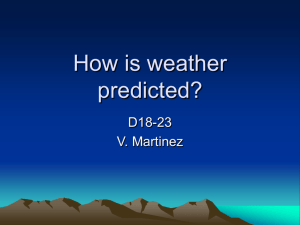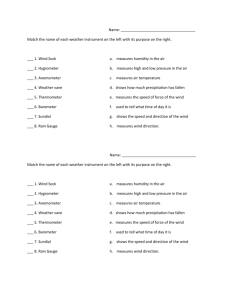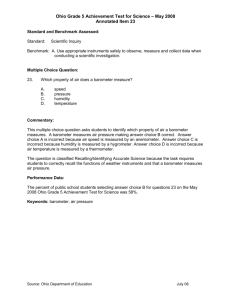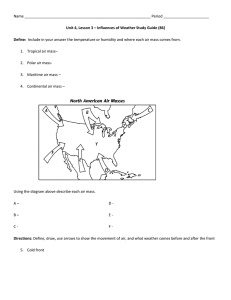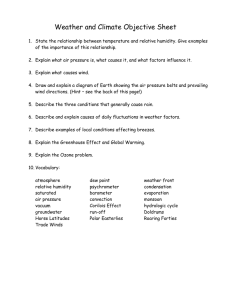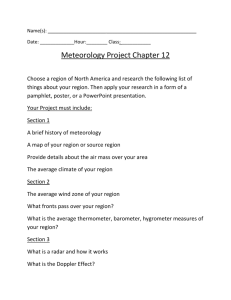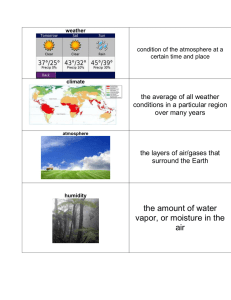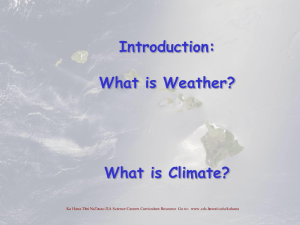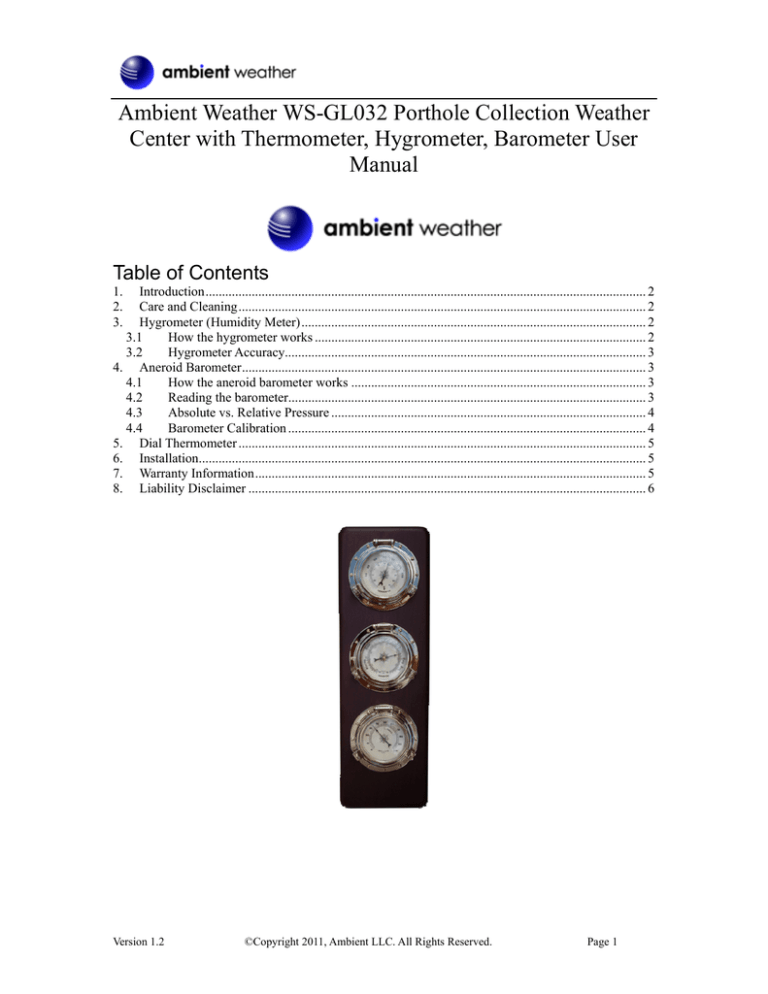
Ambient Weather WS-GL032 Porthole Collection Weather
Center with Thermometer, Hygrometer, Barometer User
Manual
Table of Contents
1.
2.
3.
Introduction ..................................................................................................................................... 2
Care and Cleaning ........................................................................................................................... 2
Hygrometer (Humidity Meter) ........................................................................................................ 2
3.1
How the hygrometer works .................................................................................................... 2
3.2
Hygrometer Accuracy............................................................................................................. 3
4. Aneroid Barometer .......................................................................................................................... 3
4.1
How the aneroid barometer works ......................................................................................... 3
4.2
Reading the barometer............................................................................................................ 3
4.3
Absolute vs. Relative Pressure ............................................................................................... 4
4.4
Barometer Calibration ............................................................................................................ 4
5. Dial Thermometer ........................................................................................................................... 5
6. Installation....................................................................................................................................... 5
7. Warranty Information ...................................................................................................................... 5
8. Liability Disclaimer ........................................................................................................................ 6
Version 1.2
©Copyright 2011, Ambient LLC. All Rights Reserved.
Page 1
1. Introduction
Thank you for your purchase of the Ambient Weather WS-GL032 Porthole Collection Weather Center
with Thermometer, Hygrometer, and Barometer. The following is a guide for preparation, care and
operation of your traditional weather station.
2. Care and Cleaning
The solid wood case is finished with a clear lacquer to protect and preserve the appearance. Although
occasional use of a good furniture polish is acceptable, we recommend periodic cleaning with a very
lightly water dampened soft cloth. Be sure to wipe the wood dry with a soft cloth before cleaning.
Avoid use of harsh household cleaners and coarse paper towels, which can damage the lacquer coating
or scratch the bezel or lens. Fingerprints and dirt may be removed the lenses and bezels with a soft
cloth lightly dampened with a mixture of water and mild dishwashing liquid. Be sure to dry the lens
and bezel with a soft cloth after cleaning.
Do not install the weather station outside. The weather station is intended for indoor use only.
3. Hygrometer (Humidity Meter)
Figure 1
3.1 How the hygrometer works
The hygrometer measures the indoor relative humidity. The sensor measures the air moisture by a
sensitive mechanical coil spring that is bonded with a moisture absorbent material.
Hygrometers register the percentage of water vapor present in the air, compared to the maximum
amount that can be present at a given temperature.
The coils in hygrometers respond slowly and while humidity levels change abruptly, it can take an
hour or more for the meter to reach an accurate reading. Remember that the hygrometer is reading
indoor humidity, and is vastly different than outdoor humidity, as reported by the National Weather
Service.
It is not uncommon to have low humidity reading during cold weather when indoor air is heater. Air
Version 1.2
©Copyright 2011, Ambient LLC. All Rights Reserved.
Page 2
conditioning also removes moisture from the air. The optimum levels are 45% to 50% during
heating and cooling seasons. Low humidity can cause health problems and can be hard on wood
furnishings. High humidity can cause mold or mildew to grow.
3.2 Hygrometer Accuracy
Humidity measurement is among the more difficult problems in basic meteorology. Accuracy is
difficult to achieve and are subject to drift, so need regular recalibration.
A further difficulty is that most hygrometers sense relative humidity rather than the absolute amount
of water present, but relative humidity is a function of both temperature and absolute moisture content,
so small temperature variations within the air in a test chamber will translate into relative humidity
variations.
4. Aneroid Barometer
Figure 2
4.1 How the aneroid barometer works
An aneroid barometer uses a small, flexible metal box called an aneroid cell. This aneroid capsule
(cell) is made from an alloy of beryllium and copper. The evacuated capsule (or usually more
capsules) is prevented from collapsing by a strong spring. Small changes in external air pressure cause
the cell to expand or contract. This expansion and contraction drives mechanical levers such that the
tiny movements of the capsule are amplified and displayed on the face of the aneroid barometer. Many
models include a manually set needle which is used to mark the current measurement so a change can
be seen. It was invented by Blaise Pascal.
4.2 Reading the barometer
It is highly advisable to lightly tap the glass near the center brass knob with your fingers before taking
a barometer reading. The light tap will overcome any friction that may affect accurate hand readings,
especially during periods of slow atmospheric changes. The Coast Guard has informed us that tapping
the barometer is even required on the most expensive aneroid barometers, because the mechanism is
made deliberately “stiff”.
The ability if the barometer to indicate changes in barometric pressure makes it a useful instrument in
weather forecasting.
Version 1.2
©Copyright 2011, Ambient LLC. All Rights Reserved.
Page 3
The weather forecast or pressure tendency is based on the rate of change of barometric pressure. In
general, when the pressure increases, the weather improves (sunny to partly cloudy) and when the
pressure decreases, the weather degrades (cloudy to rain).
The weather forecast is an estimation or generalization of weather changes in the next 24 to 48 hours,
and varies from location to location. The tendency is simply a tool for projecting weather conditions
and is never to be relied upon as an accurate method to predict the weather.
The barometer includes a manually set needle, which is used to mark the current measurement so a
change can be seen. Barometric readings should be taken daily. Remember that the rate of change of
barometric pressure is important in determining weather changes. You may want to take multiple
readings each day during periods of unstable weather conditions.
The following basic rule of thumb will hold true in using the barometer to predict weather conditions.
• A fast rise in barometric pressure means goo weather of short duration.
• A rapid drop in barometric pressure means disturbances nearby, showers of short duration.
• Regular elevation in barometric pressure usually will indicate a clear, dry weather conditions
(cold and dry in the winter).
• A slow but continuous drop in barometric pressure will indicate persistent, bad weather.
• Slow drops of 2-3 tenths mbar per 24 hours a depression of some distance away.
• Drops of 1-2 tenths mbar per hour means disturbances nearby of short duration.
• Steep drops of 6-10 tenths mbar within 4-5 hours period indicates coming rain and/or storm
with strong winds.
4.3 Absolute vs. Relative Pressure
To compare pressure conditions from one location to another, meteorologists correct pressure to
sea-level conditions. Because the air pressure decreases as you rise in altitude, the sea-level corrected
pressure (the pressure your location would be at if located at sea-level) is generally higher than your
measured pressure.
Thus, your absolute pressure (measured at your location) may read 28.62 inHg (969 mb) at an altitude
of 1000 feet (305 m), but the relative pressure (sea-level) is 30.00 inHg (1016 mb).
The standard sea-level pressure is 29.92 in Hg (1013 mb). This is the average sea-level pressure
around the world. Relative pressure measurements greater than 29.92 inHg (1013 mb) are
considered high pressure and relative pressure measurements less than 29.92 inHg are considered low
pressure.
To determine the relative pressure for your location, locate an official reporting station near you (the
internet is the best source for real time barometer conditions, such as Weather.com or
Wunderground.com), and set your weather station to match the official reporting station.
4.4 Barometer Calibration
Your barometer will operate from -100 to 3,000 feet with reliable accuracy. Aneroid barometers have a
small screw on the back for sea-level calibration. With a flat blade screwdriver, turn this screw in
either direction slightly while looking at the indicator needle. It should move in one direction or the
other. Tap the barometer to see where the needle settles. Continue this procedure until the proper
pressure reading is obtained. Do not turn the screw counter-clockwise (to the left) too far, since the
screw can fall out. After the initial calibration, no further adjustment will be required unless the
barometer is moved to a new geographic location.
Version 1.2
©Copyright 2011, Ambient LLC. All Rights Reserved.
Page 4
5. Dial Thermometer
Figure 3
The dial thermometer uses a bimetallic strip wrapped into a coil. One end of the coil is fixed to the
housing of the device and the other drives an indicating needle. The principle behind a bimetallic strip
thermometer relies on the fact that different metals expand at different rates as they warm up. By
bonding two different metals together, the coil bends, causing the needle to move. Bimetallic
thermometers are not as accurate as bulb (mercury or red spirit) thermometers. The dial thermometer
should require no calibration.
6. Installation
To install the traditional weather station, hang the plaque on a wall with the hole built into the plaque.
Only install indoors, in a clean area.
7. Warranty Information
Ambient, LLC provides a 1-year limited warranty on this product against manufacturing defects in
materials and workmanship.
This limited warranty begins on the original date of purchase, is valid only on products purchased and
only to the original purchaser of this product. To receive warranty service, the purchaser must contact
Ambient, LLC for problem determination and service procedures.
Warranty service can only be performed by a Ambient, LLC. The original dated bill of sale must be
presented upon request as proof of purchase to Ambient, LLC.
Your Ambient, LLC warranty covers all defects in material and workmanship with the following
specified exceptions: (1) damage caused by accident, unreasonable use or neglect (lack of reasonable
and necessary maintenance); (2) damage resulting from failure to follow instructions contained in your
owner’s manual; (3) damage resulting from the performance of repairs or alterations by someone other
than an authorized Ambient, LLC authorized service center; (4) units used for other than home use (5)
applications and uses that this product was not intended, such as outdoor use.
This warranty covers only actual defects within the product itself, and does not cover the cost of
installation or removal from a fixed installation, normal set-up or adjustments, claims based on
misrepresentation by the seller or performance variations resulting from installation-related
circumstances.
Version 1.2
©Copyright 2011, Ambient LLC. All Rights Reserved.
Page 5
8. Liability Disclaimer
Reading the “User manual” is highly recommended. The manufacturer and supplier cannot accept any
responsibility for any incorrect readings and any consequences that occur should an inaccurate reading
take place.
The specifications of this product may change without prior notice.
This product is not a toy. Keep out of the reach of children.
No part of this manual may be reproduced without written authorization of the manufacturer.
Ambient, LLC WILL NOT ASSUME LIABILITY FOR INCIDENTAL, CONSEQUENTIAL,
PUNITIVE, OR OTHER SIMILAR DAMAGES ASSOCIATED WITH THE OPERATION OR
MALFUNCTION OF THIS PRODUCT.
Version 1.2
©Copyright 2011, Ambient LLC. All Rights Reserved.
Page 6

